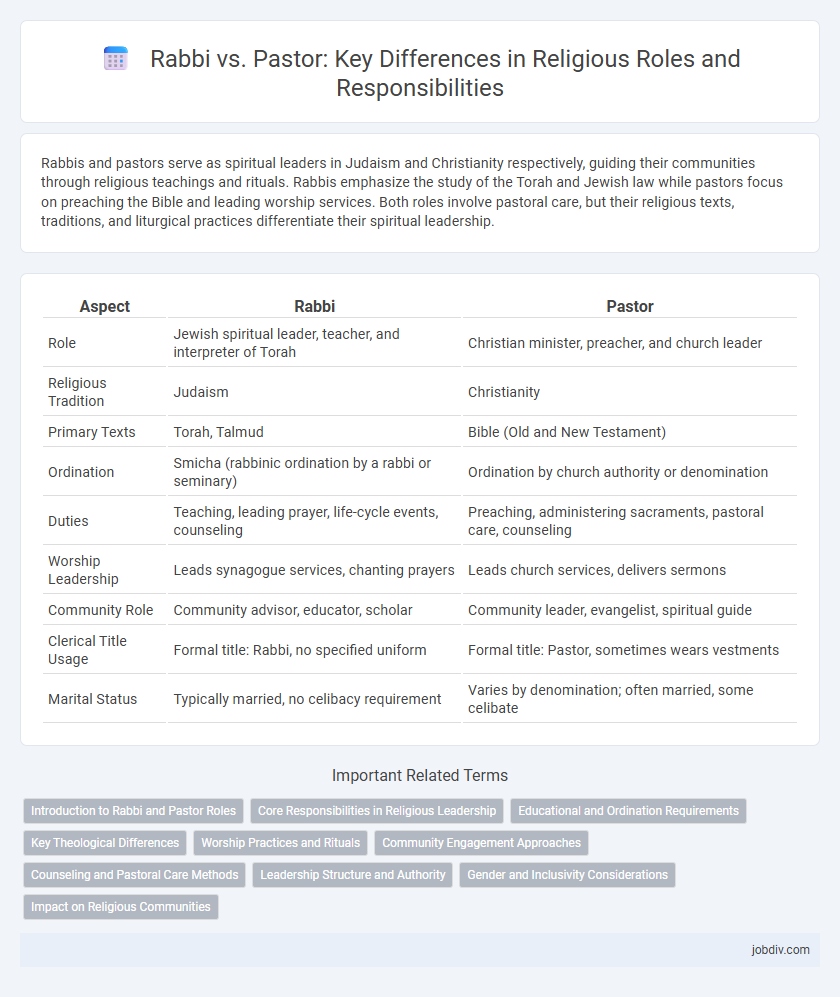Rabbis and pastors serve as spiritual leaders in Judaism and Christianity respectively, guiding their communities through religious teachings and rituals. Rabbis emphasize the study of the Torah and Jewish law while pastors focus on preaching the Bible and leading worship services. Both roles involve pastoral care, but their religious texts, traditions, and liturgical practices differentiate their spiritual leadership.
Table of Comparison
| Aspect | Rabbi | Pastor |
|---|---|---|
| Role | Jewish spiritual leader, teacher, and interpreter of Torah | Christian minister, preacher, and church leader |
| Religious Tradition | Judaism | Christianity |
| Primary Texts | Torah, Talmud | Bible (Old and New Testament) |
| Ordination | Smicha (rabbinic ordination by a rabbi or seminary) | Ordination by church authority or denomination |
| Duties | Teaching, leading prayer, life-cycle events, counseling | Preaching, administering sacraments, pastoral care, counseling |
| Worship Leadership | Leads synagogue services, chanting prayers | Leads church services, delivers sermons |
| Community Role | Community advisor, educator, scholar | Community leader, evangelist, spiritual guide |
| Clerical Title Usage | Formal title: Rabbi, no specified uniform | Formal title: Pastor, sometimes wears vestments |
| Marital Status | Typically married, no celibacy requirement | Varies by denomination; often married, some celibate |
Introduction to Rabbi and Pastor Roles
A Rabbi serves as a spiritual leader and teacher within the Jewish community, guiding religious practices, interpreting Jewish law (Halacha), and leading synagogue services. A Pastor functions as a Christian minister responsible for preaching, pastoral care, and administering sacraments in a church setting. Both roles emphasize spiritual guidance, community leadership, and religious education tailored to their respective faith traditions.
Core Responsibilities in Religious Leadership
Rabbi and pastor share core responsibilities in religious leadership, including teaching sacred texts, guiding congregational worship, and providing spiritual counseling. Rabbis primarily focus on interpreting and teaching the Torah and Talmud within Jewish communities, while pastors center their ministry on the Bible and Christian doctrine for church members. Both roles emphasize community leadership, ethical guidance, and fostering faith development among their followers.
Educational and Ordination Requirements
Rabbis undergo extensive Jewish theological education, often earning a degree from a yeshiva or seminary, which includes deep study of the Torah, Talmud, and Jewish law, while pastors typically attend a Christian seminary, focusing on the Bible, theology, and pastoral care. Rabbinic ordination, known as semikhah, requires rigorous examination by established rabbis to demonstrate mastery of Jewish texts and law; pastoral ordination varies widely by denomination but generally involves completing seminary training and demonstrating preaching and pastoral skills. The educational paths reflect the distinct religious traditions and emphasize comprehensive knowledge and spiritual leadership within their respective communities.
Key Theological Differences
Rabbi and Pastor hold distinct roles within Judaism and Christianity, emphasizing differing theological foundations. Rabbis interpret and teach the Torah and Talmud, focusing on Jewish law, tradition, and communal guidance, while pastors preach the New Testament, centering on salvation through Jesus Christ and the Christian doctrine of grace. The rabbinic role integrates covenantal law and community leadership, whereas pastoral ministry emphasizes evangelism, sacraments, and spiritual shepherding within a faith-based congregation.
Worship Practices and Rituals
Rabbis lead Jewish worship through Torah readings, prayers like the Amidah, and rituals including Shabbat services and kosher dietary laws, emphasizing synagogue-based communal prayer and study. Pastors guide Christian worship by delivering sermons based on the Bible, leading sacraments such as Communion and Baptism, and facilitating congregational singing and prayer within church services. These distinct practices reflect the theological and cultural foundations of Judaism and Christianity, highlighting differences in worship structure, liturgy, and ritual observance.
Community Engagement Approaches
Rabbis often engage community through study groups, cultural events, and lifecycle ceremonies that emphasize Jewish tradition and collective learning. Pastors typically focus on sermons, outreach programs, and pastoral care designed to foster spiritual growth and individual transformation within a Christian framework. Both leverage community gatherings but tailor activities to reflect theological priorities and congregational needs unique to Judaism and Christianity.
Counseling and Pastoral Care Methods
Rabbi counseling integrates Jewish law (Halacha) with spiritual guidance, emphasizing communal responsibility and personalized pastoral care within synagogue settings. Pastor counseling often incorporates Christian theology and scripture, focusing on prayer, confession, and moral support tailored to individual spiritual growth and healing. Both approaches prioritize empathy and confidentiality but differ in ritual practices and doctrinal foundations during pastoral care sessions.
Leadership Structure and Authority
Rabbi leadership in Judaism centers around religious scholarship and community guidance, where authority often stems from expertise in Torah interpretation and Halacha. Pastors in Christian churches typically hold formal pastoral ordination and exercise authority through ecclesiastical hierarchy and congregational leadership. While rabbis may lead by teaching and communal respect, pastors usually combine spiritual oversight with administrative duties within organized church structures.
Gender and Inclusivity Considerations
Rabbi roles have traditionally been held by men, but contemporary Jewish communities increasingly recognize women and non-binary individuals as rabbis, promoting gender inclusivity. Pastoral leadership in many Christian denominations has similarly expanded to include women and LGBTQ+ individuals, though acceptance varies widely across denominations. Both roles reflect evolving religious attitudes toward gender equality and inclusivity, challenging historical norms within their respective faith traditions.
Impact on Religious Communities
Rabbis serve as spiritual leaders and educators within Jewish communities, shaping religious practices through Torah study and interpretation, while pastors guide Christian congregations with biblical teachings and pastoral care. Both roles foster community cohesion, moral development, and spiritual growth, but their approaches differ according to distinct religious traditions and cultural contexts. The impact of rabbis and pastors is profound, influencing worship styles, religious education, and communal support systems across diverse faith communities.
Rabbi vs Pastor Infographic

 jobdiv.com
jobdiv.com